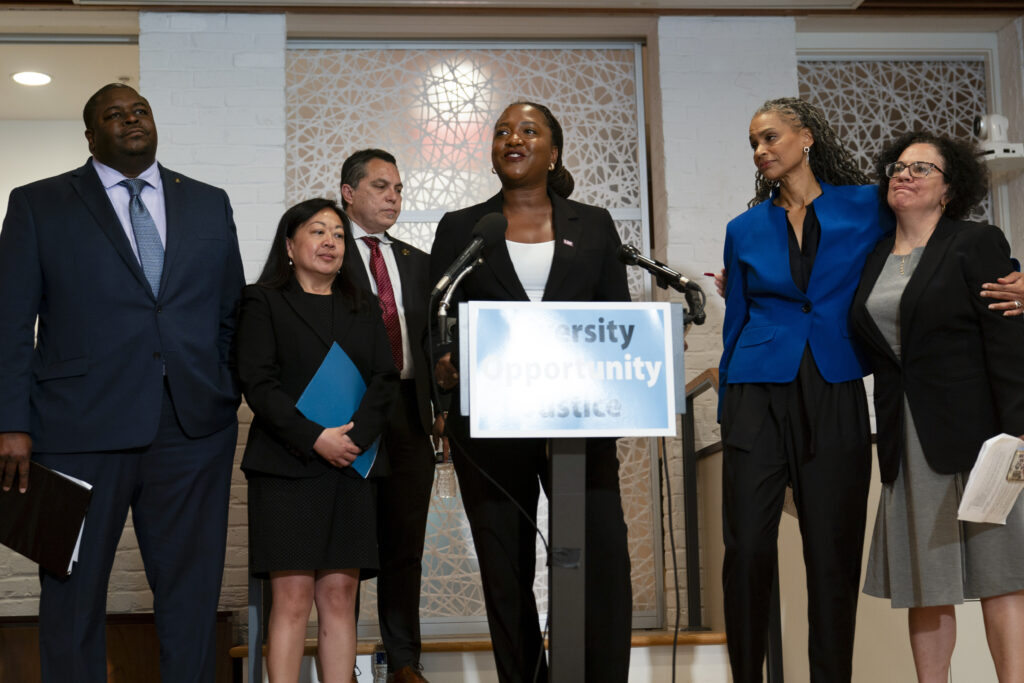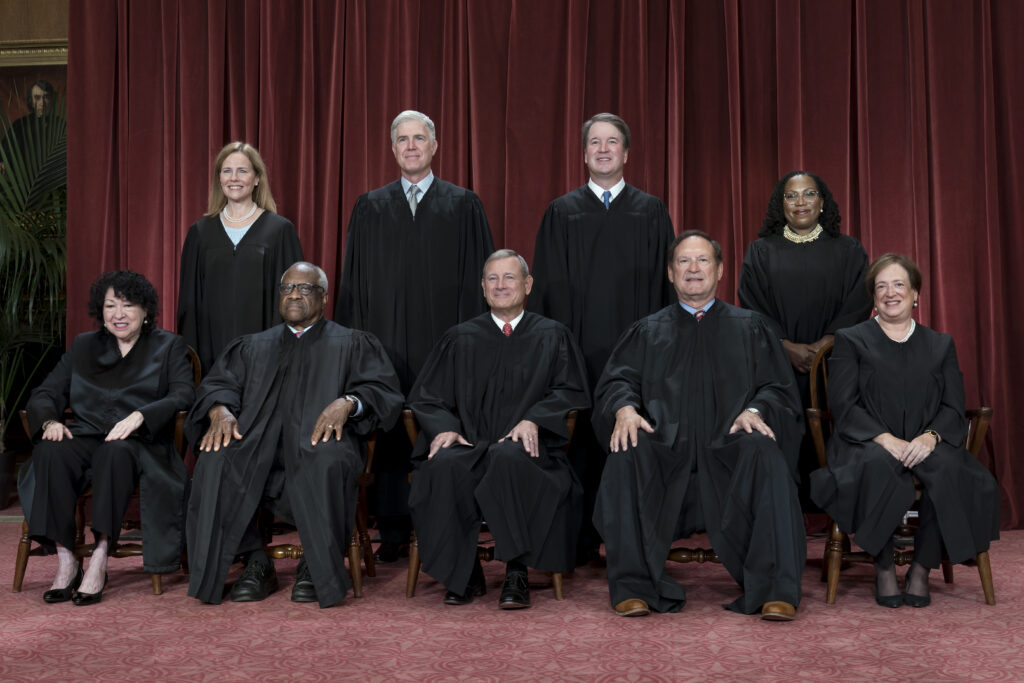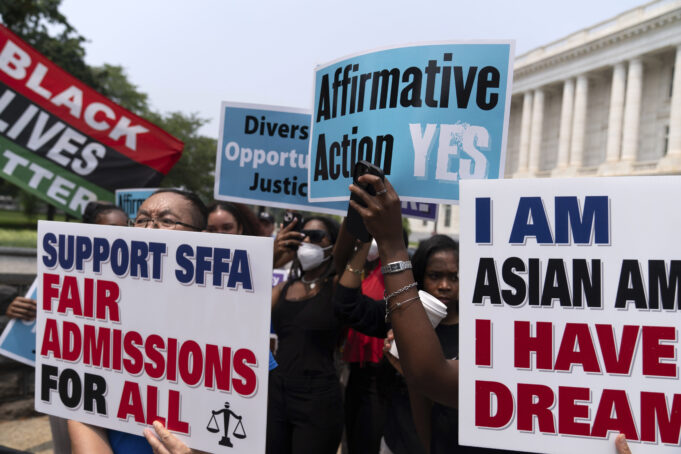Breaking with 45 years of legal precedent, the U.S. Supreme Court banned any consideration of race, regarding the pursuit of diversity, equity, and inclusion on American college campuses, June 29, after a Conservative-backed student group appealed a lower court’s decision to uphold Affirmative Action regarding admissions.
In 6-2 and 6-3 decisions, the high court ruled that race-conscious remedies, at Harvard College and at the University of North Carolina (UNC), to their well-documented histories of anti-Black racism and institutional discrimination are now violations of the Equal Protection Clause of the Fourteenth Amendment, thereby making such corrective measures unlawful.
According to a June 5 Brookings Institution commentary by Professor Richard Lempert, a former chair of the University of Michigan Law School’s committee that drafted Affirmative Action policy upheld by the Supreme Court in 2003 (Grutter v. Bollinger), he acknowledged that race-conscious solutions have divided the country as they have divided the courts, and said that earlier decisions, such as the landmark Regents of the University of California v. Bakke in 1978, established a precedent that allowed colleges and universities to pursue race-based Affirmative Action plans in the name of diversity.
Although the Bakke decision ruled 5-4 that a university’s use of racial “quotas” in its admissions process was unconstitutional, it also said that a school’s use of “affirmative action,” to accept more minority applicants, was constitutional in some circumstances. “Justice Powell, alone in the center, and with the support of four justices, ruled the (UC Davis) program’s numerical quota meant that the program could not withstand constitutional scrutiny,” Professor Lempert said.

“But (Powell) also wrote that creating racially diverse educational environments was a compelling state interest sufficient to overcome any constitutional bar on the consideration of race so long as race was only one among many factors that a school used in deciding whom to admit.”
Questioning why the argument was based upon diversity and inclusion, over the need for a remedy to the legacy of enslavement and other race-based harms that followed, Professor Lempert opined that the Bakke decision closed the door to most arguments that would have solidly favored a stronger position on that issue.
“By the time of Bakke, it was perhaps too late for a discussion of what the 14th Amendment’s framers intended with respect to racial preferences, but Justice (Thurgood) Marshall made such an argument, which Justice Powell rejected, as he did issues of social justice,” Lempert’s commentary said of the 1978 ruling.
“One might fairly ask, why in a society where race-based biases, both implicit and explicit, hamper the life chances of Black and Brown people more than others, do social justice concerns have nothing to say about the constitutionality of affirmative action?” Professor Lempert asked. “Yet law schools and medical schools are unable to defend the constitutionality of racial admissions preferences by referencing such data. This is another path that Bakke barred,” he said.
An attack on equity in higher learning
Regarding the final closing of the question of race-conscious admissions, the Students for Fair Admissions, Inc. v. President and Fellows of Harvard College case,the 6-2 ruling, from which Justice Ketanji Brown Jackson recused herself, and the 6-3 decision regarding the University of North Carolina, a school chartered by its General Assembly in 1789, both provoked harsh responses from social justice advocates as well as strong dissenting opinions from Justice Sonia Sotomayor and Justice Brown Jackson.

Photo: AP Photo/J. Scott Applewhite
“For much of its history, UNC was a bastion of White supremacy,” Justice Sotomayor wrote on page 22 of her 69-page dissenting opinion. “It’s leadership included slaveholders, the leaders of the Ku Klux Klan, the central figures in the White supremacy campaigns of 1898 and 1900, and many of the State’s most ardent defenders of Jim Crow and race-based Social Darwinism in the twentieth century.
“The university excluded all people of color from its faculty and student body, glorified the institution of slavery, enforced its own Jim Crow regulations, and punished any dissent from racial orthodoxy. It resisted racial integration after this Court’s decision in (Brown v. Board of Education) and was forced to integrate by court order in 1955.
It took almost 10 more years for the first Black woman to enroll at the university in 1963,” Justice Sotomayor wrote, noting a variety of reasons why the Court’s majority opinion was wrong and why precedent should have been respected as both legal and moral solutions to America’s deep social, political, and economic divisions.
Although Justice Brown Jackson recused herself from the Harvard College case, regarding the Conservative-backed Students for Fair Admissions, Inc. v. University of North Carolina, et al., she wrote in the introduction of her 29-page dissenting opinion:
“Gulf-sized race-based gaps exist with respect to the health, wealth, and well-being of American citizens. They were created in the distant past but have indisputably been passed down to the present day through the generations. Every moment these gaps persist is a moment in which this great country falls short of actualizing one of its foundational principles—the ‘self-evident’ truth that all are created equal.
Yet, today, the Court determines that holistic admissions programs like the one that the University of North Carolina (UNC) has operated, consistent with Grutter v. Bollinger, 539 U.S. 306 (2003), are a problem with respect to achievement of that aspiration, rather than a viable solution (as has long been evident to historians, sociologists, and policymakers alike).”
Stating that the court’s final decision, on racially conscious inclusion programs, applies only to higher education in the civilian sector, and not for military service schools, Justice Brown Jackson added:
“The Court has come to rest on the bottom-line conclusion that racial diversity in higher education is only worth potentially preserving insofar as it might be needed to prepare Black Americans and other underrepresented minorities for success in the bunker, not the boardroom (a particularly awkward place to land, in light of the history the majority opts to ignore).
It would be deeply unfortunate if the Equal Protection Clause actually demanded this perverse, ahistorical, and counterproductive outcome. To impose this result in that Clause’s name when it requires no such thing, and to thereby obstruct our collective progress toward the full realization of the Clause’s promise, is truly a tragedy for us all,” her dissent concluded.
In an emailed message to The Final Call, NAACP president and CEO Derrick Johnson said the Supreme Court’s decision places Black America’s hard-fought progress in jeopardy, both inside and outside of classrooms across the country.
“Today the Supreme Court has bowed to the personally held beliefs of an extremist minority,” the NAACP president insisted. “We will not allow hate-inspired people in power to turn back the clock and undermine our hard-won victories. The tricks of America’s dark past will not be tolerated,” he said in part.
“Race plays an undeniable role in shaping the identities of and quality of life for Black Americans. In a society still scarred by the wounds of racial disparities, the Supreme Court has displayed a willful ignorance of our reality,” he wrote. “The NAACP will not be deterred nor silenced in our fight to hold leaders and institutions accountable for their role in embracing diversity no matter what.”
Department of Government professor Dr. Eric McDaniel, co-director of the Politics of Race and Ethnicity Lab at the University of Texas at Austin, told The Final Call that politics colored the Supreme Court’s June 29 ruling, as previous rulings on the question of interpreting the 14th Amendment’s Equal Protection clause have been colored, to weaken the standing of race-conscious Affirmative Action programs.
“Among the first things people pointed out is that Affirmative Action is not dead, it’s in using race in Affirmative Action (that’s dead), they’re still letting legacies in, they’re still letting the donors get in and things like that,” Prof. McDaniel said of those with alumni or family connections to America’s elite schools and how the power of money still influences the admissions process.
“Whereas White people see this as a win, they’re going to realize that really the role of Affirmative Action on campuses wasn’t as big as you made it out to be, and there’s going to be a larger influx of Asian students, especially in schools (in California), so, Whites think they will benefit from it, and they’re not,” said Prof. McDaniel, describing how an ambiguous racial hierarchy emerged where Asians and Hispanics are increasingly being associated with White in institutions of higher learning and within competitive fields of employment.
“Think about the hierarchy in South Africa, you have the Whites at the top, Coloureds, in the middle, and Blacks at the bottom,” Prof. McDaniel explained. “This is really about resegregating America, but when we think of higher education, (it’s) really one of those key things that’s seen as a way of moving people up the economic ladder, and what you’ve now done is move it to where the higher levels of education are going to be even more likely to go to the wealthy,” he said of America’s current political climate and the need for Black people to look inward for solutions. “The fight for Black liberation has to become your lifestyle, not something you do from time-to-time, but your actual lifestyle.”
A new educational paradigm
Defining the “knowledge of self” as the basis of implementing his movement’s “Do-for-Self” work ethic, the Eternal Leader of the Nation of Islam, the Most Honorable Elijah Muhammad, said in his book, “Message to the Blackman in America,” published in 1965, that too many Black people have not been taught a knowledge of themselves, which in turn limits an understanding of the environment, the time, and what must be done to master the world in which one lives.
“The lack of knowledge of self is a prevailing condition among my people here in America. Gaining the knowledge of self makes us unite into a great unity,” the Messenger wrote on page 39. “Knowledge of self makes you take on the great virtue of learning.
“Many people have attempted to belittle or degrade my followers by referring to them as unlettered or unschooled,” Mr. Muhammad wrote. “They do this to imply that the believers in Islam are ignorant. If such a claim were so, then all the more credit should be given for our striving for self-elevation with so little. No followers, nor any other people are more zealous about the acquiring of knowledge than my followers,” he said. “Throughout the Holy Qur’an, the duty of a Muslim to acquire knowledge is spelled out.”
In his 2009 keynote address delivered to the Nation of Islam’s annual Saviours’ Day Convention, the Honorable Minister Louis Farrakhan quoted Woodrow Wilson, the 28th President of the United States and a former president of Princeton University, who called for an educational system that stratified American society into two basic classes.
“We want a class of persons to have a liberal education and we want another class of persons, a very much larger class, of necessity, to forego the privilege of a liberal education and fit themselves to perform specific difficult manual tasks,” Wilson said as president of Princeton University to the New York City High School Teachers Association in 1909. He would later serve as President of the United States from 1913 to 1921.
Countering President Wilson’s assertions, the Honorable Minister Louis Farrakhan said that over time, the subtle poisons of so-called White supremacy affected the darker people of the earth in ways that often lead to self-hatred, dysfunction, and failure, particularly when seeing no one with whom to identify, and as human beings, to become proud of what God made them.
“But when you tell that little child, ‘Ye are all gods, children of the Most High God,’ I’m not looking for a hero that runs the mile; I’m not looking for a hero that throws balls in baskets; I’m not looking for a hero that preaches the Word of God,” the Minister said. “I’m looking for God, for I am made in His image and after His likeness, and I am a god! You have to tell these children who they are! Give them God as the Example! If God is the Example, what an Excellent Example! He created everything that I am seeing. Nothing He created is mediocre. Everything is excellent.”













